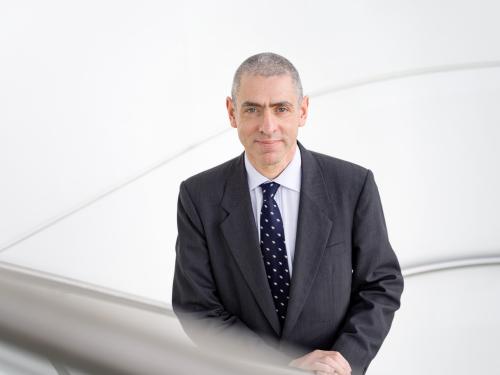
Peter Dayan, a researcher in the fields of theoretical neuroscience and artificial intelligence, has recently been appointed as a Director at the Max Planck Institute for Biological Cybernetics in Tübingen. In this function he will also establish a new department and play a key role in the reorientation of the institute. His research focus is on computational neuroscience. He is researching decision-making processes in the brain, neuromodulators and neuronal malfunctions in psychiatric diseases. Peter Dayan has used theoretical models to investigate various forms of learning. The studies on so-called reinforcement learning focus on how the brain integrates information from past rewarding and punishing experiences to make appropriate choices in the future.
Peter Dayan studied at the University of Cambridge and received his PhD from the University of Edinburgh. After research stays in San Diego, Toronto and Boston, he helped found the Gatsby Computational Neuroscience Unit in London. He served as the institution‘s director from 2002 until 2017. He also served as the Deputy-Director of the Max Planck/UCL Center for Computational Psychiatry and Ageing Research. Since 2018 Peter Dayan has been a Fellow of the Royal Society.

3 questions to Peter Dayan
Why did you choose to come to Tübingen to continue your research?
The Max Planck Institute for Biological Cybernetics is one of the main places in which my field of theoretical neuroscience was born and nurtured. It is a particular honor and privilege to have the opportunity to help forge the next phase of its development. This, and the singular richness of the academic and didactic environments in neuroscience, machine learning and beyond across the University of Tübingen and the Max Planck Campus, were critical in our decision to come here. And we haven’t been disappointed.
How can the collaboration between the different research institutions in the city benefit your research focus?
Collaboration is central to a field as interdisciplinary as mine. The prospective first set of links was clear before I came – with the Max Planck Institute for Intelligent Systems, the Werner Reichardt Centre, the Bernstein Center for Computational Neuroscience and the Department of Psychiatry and Psychotherapy of the University Hospital Tübingen. And indeed, people in all these institutions have been kind enough to foster these ties. However, one of the best aspects of moving to a new place that has the depth and breadth of Tübingen is the unexpected opportunities that it affords – to hybridize ideas, insights and methods between neighboring fields. Even in the short time I’ve been here, I have had the inkling that this is going to work very well.
What are your impressions of Tübingen thus far?
Zhaoping and I are most grateful for the uncomplicated generosity of the university in our original discussions, and the wonderful “Gemütlichkeit” of the welcome that we have universally received. It has been a special treat for me to have had the chance to visit potential colleagues and their labs across the campuses. I am also grateful to the surprisingly many hills for keeping me fit.
We welcome Prof. Dr. Vlasta Sikimić. She is an Assistant Professor of Philosophy of Science and a member of the Philosophy & Ethics group at Eindhoven University of Technology. Her research focus is on Social Epistemology of Science, Metascience, Philosophy of AI in Science and Philosophy of AI in Education.
Prof. Dr. Vlasta Sikimić will hold a workshop, which is aimed at researchers from all disciplines, especially female early career scientists.
Building inclusive science: be the driver of change
When: Tuesday, 13 May 2025 from 2:00 to 5:00 p.m.
Where: Carl Friedrich von Weizsäcker Center, lecture room; Doblerstr. 33, 72074 Tübingen
How: Registration until 9 May via: https://eveeno.com/805380713